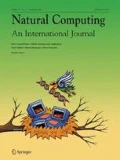Physics and computation is an area, at the border of computer science and physics, that studies computing machines and the limits of computation from a physical point of view, and uses computability theory and information theory as a new language to express physics theories.
This Special Issue is dedicated to a selection of papers presented at the Physics and Computation conference held in Ponta-Delgada (Portugal) in September 2009. This conference was organized as a satellite event of Unconventional Computation 2009. It consisted of fifteen presentations. These fifteen papers where invited for a submission to this special issue and six were finally selected, after having been reviewed in the way usual to Natural Computing.
These papers illustrate several of the trends of the current research on the physics of computation: three are dedicated to various aspects of quantum computing, ranging from quantum cellular automata, quantum walks and de-quantisation of quantum algorithms. One paper discusses the robustness of the Turing frontier in presence of supertasks. One paper compares two notions of computability over the real numbers. And one paper presents a physically inspired model of computation, shifting from structured to amorphous computing.
We would like to take this opportunity to thank the authors and the referees who made this special issue possible.
Author information
Authors and Affiliations
Corresponding author
Rights and permissions
About this article
Cite this article
Bournez, O., Dowek, G. Preface. Nat Comput 11, 1 (2012). https://doi.org/10.1007/s11047-011-9283-8
Published:
Issue Date:
DOI: https://doi.org/10.1007/s11047-011-9283-8

